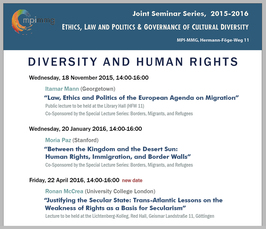"The Politics of the Human"
Joint Seminar Series 2015/16 "Diversity and Human Rights"
- Date: Jun 22, 2016
- Time: 02:00 PM - 04:00 PM (Local Time Germany)
- Speaker: Anne Phillips (London School of Economics)
- Anne Phillips is the Graham Wallas Professor of Political Science at the London School of Economics. She was previously Director of the LSE Gender Institute, one of the largest centres for gender teaching and research in Europe. Her publications include The Politics of Presence (1995), Multiculturalism without Culture (2007); Gender and Culture (2010); Our Bodies, Whose Property? (2013); and The Politics of the Human (2015). She holds honorary degrees from the Universities of Aalborg and Bristol. She was elected a Fellow of the British Academy in 2003 and of the (British) Academy of Social Sciences in 2012.
- Location: Lichtenberg-Kolleg Historic Observatory, Geismar Landstraße 11, 37083 Göttingen

For more details please contact recke(at)mmg.mpg.de.
The notion of the human and, more specifically, the idea that we share a common humanity, is one of our most powerful moral and political ideals. It has been central to the explosion of human rights thinking, politics, and legislation over the last 70 years: to that profound shift from claiming the rights of ‚man‘ or ‚citizen‘ to asserting our rights simply as human beings. In principle if not yet in practice, this marks a major extension of egalitarianism. It says that all of us, regardless of gender, race, sexuality, culture, nationality, have the same rights and equalities simply by virtue of being human.
Yet with all its seeming inclusiveness, the figure of the human can operate to make equality conditional. Here I explore three ways in which this happens: through making the equality conditional on exhibiting what have been taken to be the essential human characteristics; through making it conditional on exhibiting the ‘good’ human characteristics; and through making it conditional on ignoring the differences between us. Against these conditionalities, I argue that we should abandon the search for reasons or justifications for regarding others as our equals. We should accept human equality for what it is, a commitment and a claim: a commitment to treat others as our equals, and a claim on others that they should do so.